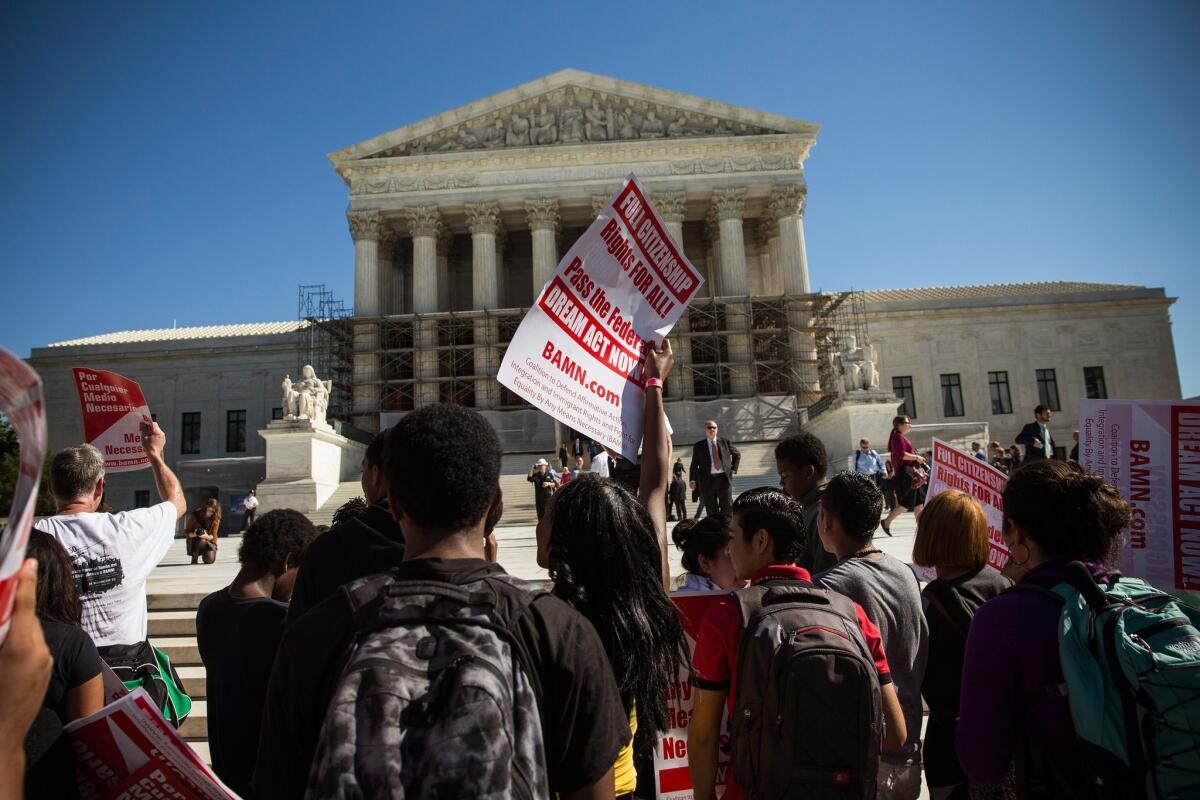Supreme Court justices voice support for affirmative action ban

WASHINGTON — The Supreme Court’s conservative justices signaled Tuesday they are likely to uphold a Michigan voter initiative that forbids its state universities from granting “preferential treatment” to applicants because of their race.
The Michigan measure was modeled on a law adopted by California’s voters in 1996, but it was struck down last year by a federal appeals court in Ohio. Those judges said the state’s voters, most of whom are white, had taken away a special admission policy that helped bring racial diversity to the state campuses.
A Michigan state attorney urged the high court to reject that decision. “It does not violate equal protection [under the Constitution] to require equal treatment,” said state Solicitor General John Bursch. He said the voters had done no more than “repeal preferences” based on a student’s race.
PHOTOS: 2013’s memorable political moments
Much of the hourlong argument turned into a debate on what is meant by equal treatment under law. The conservatives said that ignoring a student’s race constituted equal treatment, while the liberals said that ignoring the race of black and Latino students denied them true equality under the law as required under the 14th Amendment.
Justice Sonia Sotomayor sharply questioned the Michigan state lawyer and said she agreed with the reasoning of the lower court. She has described herself as a beneficiary of affirmative action. She grew up in the South Bronx and was of Puerto Rican heritage when she won admission to Princeton University and Yale Law School. She excelled as a student and won top honors.
Ending affirmative action would “bring back segregation” to Michigan’s universities, Sotomayor said. The voters took away “the one tool” that could bring racial diversity to the University of Michigan and its graduate schools, she said. At times, she was joined by Justice Ruth Bader Ginsburg, who said the court historically had questioned laws that take away a “protection for minorities.”
But a majority of the justices have been skeptical of race-based admissions policies, and they seemed ready to uphold the Michigan measure.
“The whole point of the equal protection clause is to take race off the table,” Chief Justice John G. Roberts Jr. said. Why can’t the voters say they want the university to operate “without racial preferences because we want to take race off the table?”
Mark Rosenbaum, an ACLU lawyer from Los Angeles, cited the court’s precedents from the 1960s that frowned upon state initiatives allowing white voters to overturn civil rights protections. Normally, the university faculty sets the admissions policy, he said. But in this instance, the state voters intervened. They “singled out race for different treatment,” Rosenbaum said.
But most of the precedents he cited were at least 30 years old, and they do not appear to have much support on the current court. Justice Anthony Kennedy said he did not understand why state lawmakers or the state’s voters cannot decide on major policies for the state universities.
If the high court were to strike down the Michigan measure, it probably would spell the end for California’s Proposition 209. The two measures use the same wording. California Atty. Gen. Harris and the chancellors of the University of California system filed friend-of the-court briefs on the side of the challengers.
But to win, Rosenbaum needs the vote of at least one of the five conservative-leaning justices, and it did not appear that he had succeeded in winning a convert during the oral argument.
ALSO:
Two Florida girls charged with bullying friend to death
Denver considers bringing smell of criminality to some pot use
Skydiver dies after ‘swooping’ stunt; bystander is hit but survives
Follow L.A. Times National on Twitter
More to Read
Sign up for Essential California
The most important California stories and recommendations in your inbox every morning.
You may occasionally receive promotional content from the Los Angeles Times.











